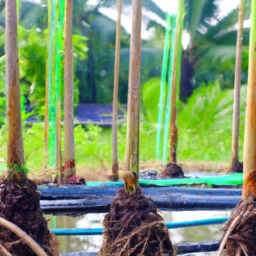Gardening Helping the Environment
How Gardening Helps The Environment
How Gardening Helps The Environment
Improving Air Quality
Gardening can improve air quality in several ways. Firstly, it helps to reduce air pollution by absorbing pollutant particles. Plants act as filters capturing pollutants such as sulfur dioxide, nitrogen dioxide and ozone in their leaves and sequestering them in their cells.
Furthermore, gardening can improve air quality by producing oxygen. Photosynthesis by plants is a key factor to improving air quality, as it helps to cleanse the air by converting atmospheric carbon dioxide into oxygen. The process of photosynthesis allows plants to absorb carbon dioxide and release oxygen, making the air cleaner and fresher for everyone to breathe.
Increasing Temperature Resilience
Gardening can help to make cities and communities more resilient to extreme weather events. Planting trees and other greenery can ensure shade and help to reduce temperatures in urban areas, decreasing the urban heat island effect. It can also create microclimates, providing a green infrastructure that can help communities better cope with the impacts of climate change. Planting trees can also help to reduce wind chill in the winter, making cities more bearable for residents.
In addition, plants can create thermal insulation, which helps to reduce the amount of excess heat from buildings into the surrounding environment. Gardens can also act as barriers to help buffer the impact of strong winds, making cities more resistant to extreme weather events.
Reducing Soil Contamination
Gardening can help reduce soil contamination by preventing runoff containing pollutants from reaching rivers and lakes. Plants can absorb contaminants in the soil, which can help to reduce water pollution. Plant roots can also help to bind the soil and prevent runoff, reducing the amount of pollutants that reach bodies of water.
In addition, plants can improve soil fertility. Planting a garden can help to improve soil structure and increase the amounts of essential nutrients in the soil. When plants break down, they add organic matter to the soil, which provides essential nutrients for other plants.
Enhancing Biodiversity
Gardens can play an important role in conserving biodiversity. They provide food and shelter for plants and animals, helping to support whole ecosystems. Planting native plants helps to create important wildlife corridors, which are important for allowing species to migrate, find food, and breed.
In addition, urban gardens create important refuges for species that are not adapted to living in a highly developed urban environment. They provide shelter and protection for species that would otherwise not be able to survive in an urbanized area. These gardens also provide a safe space for species to feed and breed, helping to maintain a healthy balance in the ecosystem.
Supporting Local Food Production
Gardening can help to support local food production. By providing space for growing fruits, vegetables, and herbs, urban gardens can provide access to nutritious and fresh produce for those living in urban areas. This can help to reduce food insecurity and improve access to healthy food for those who live in food deserts.
In addition, urban gardens can help to promote sustainable farming practices. By providing an environment for high-yielding, low input farming methods, urban gardening can help to reduce the amount of energy, water, and resources used for food production.
Closing Remarks
Gardening is an important practice for helping the environment. It can help improve air and water quality, increase temperature resilience, reduce soil contamination, enhance biodiversity, and support local food production. By introducing gardening into our daily lives, we can help to ensure that our environment is healthy and sustainable.

Previous Page
Next Page
